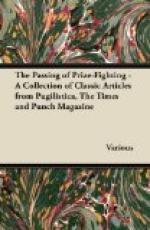For myself it was not her viciousness that worried me, it was her vulgarity; and of this she seemed quite unconscious. Her speech abounded in second-rate colloquialisms. Was it her environment that taught her to say dreadful things like “Put that in your pipe and smoke it”? The cheap fun that she got out of a girl-friend who had made it a rule to pray for her was the kind of thing you would be sorry to find in a common boarding-school. And are gentlefolk in the habit of asking a man, as Constance did, how it was that he ever came to get engaged to such a woman as the one of his choice? In Bayswater it simply isn’t done.
At the end of the First Act, after many trivialities and the waste of precious time over a description of certain characters that were presently to appear and endorse it, there was a sudden diversion. The professional card of a private detective was discovered in an arm-chair. No one seemed to know how it got there, and, as the curtain chose this moment to fall, we were left in a state of palpitation, wondering how we were to get through the interval with our curiosity unappeased. Ultimately it turned out that the detective was to be employed by Miss Ussher (aunt) to verify her suspicions with regard to the morals of Constance. But I shall never get you to believe me when I say that the subject was not so much as touched again till the final Act.
I have spoken of the incongruous stuff of which old Jacob Ussher’s heart was constructed. That strange organ was hard enough to make him give his daughter away to his secretary in the matter of the forgery; but when it came to a question of the exposure of her relations with her lover this same heart was found to be of the consistency of putty.
I hope I shall not seem guilty of Constance’s indiscretion if I politely wonder how it was that so astute a judge as Miss MARIE LOeHR accepted this play. Actor-managers, of course, have been known to produce indifferent work for the sake of a good acting part for themselves. If that was her motive I think she must have imagined a fine subtlety in a character which was difficult only because it was loosely conceived. If she failed to make it plausible it was not for want of very adroit handling.
In Jacob Ussher Mr. ESMOND gave himself a most congenial part, in which he easily surpassed his achievement as author. Mr. TOZER as a slum-parson was extremely probable with his quiet sincerity. But our chief consolation came from Miss RACHEL DE SOLLA as the maiden aunt, a reactionary type of the most confirmed stolidity, with a weakness for diamonds and indigestion. Miss MARIE LOeHR had many clever things to say, but it didn’t matter what Miss DE SOLLA said; her manner was irresistible.
I must doubt, however, whether the excellent work of the actors will carry the play to success. Even its title is obscure. The only thing I know about “birds of a feather” is that they are supposed to “flock together”; and I have always been given to understand that the adage alludes to the mutual attraction of similar types. Nobody ever told me that it was meant to indicate that the sins of the father bird are liable to be reproduced in his chicken,




